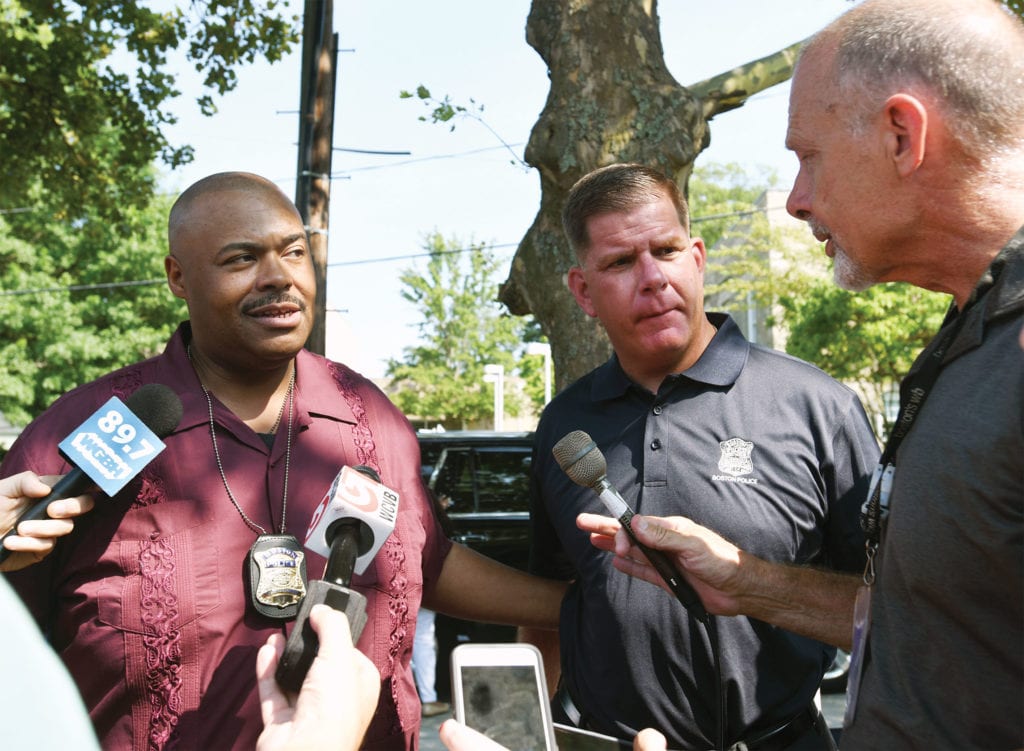Boston will expand police body camera program
Study finds fewer civilian complaints, other benefits to wearing body cameras.

After four years of advocacy by civil rights groups, the Walsh administration announced last week that Boston Police officers will be outfitted with body-worn cameras.
The cameras will be phased in, with 400 of the department’s 2,200 officers receiving cameras in the first installment. The move to expand use of body cameras comes after a pilot project, which saw approximately 100 officers outfitted with the devices. An independent study found a slight decrease in civilian complaints and fewer reports of use of force in the study cohort than among officers not wearing the devices.
In a statement to the media, Walsh said the implementation of body cameras would enhance the department’s community policing efforts.
“Boston is a model city in our nation for having strong police-community relations, and our goal is to continue building trust and positive relationships between law enforcement officers and community members,” his statement read.
Boston Police Body Camera Action Team founder Segun Idowu called the mayor’s decision to extend the program a victory for grassroots activists.
“I applaud Mayor Walsh’s push to begin the body camera program as quickly as possible, and am grateful to him for keeping his word to do so,” he said in a statement.
Boston trails behind other major cities in its use of body-worn cameras — a technology that has been widely deployed in recent years following a series of high-profile police shootings of unarmed blacks across the nation. Walsh was consistently non-committal about implementing body-worn cameras in Boston. The Boston Police Patrolman’s Association voiced opposition to the use of the devices.
Under political pressure, the department agreed to an initial six-month study in 2017, then extended the study period an additional six months. During last year’s mayoral election, Walsh was non-committal on implementing cameras citywide, telling reporters he would wait for the results of a study on the pilot program, which was conducted by researchers at Northeastern University.
When the final report on the project was released last week, the Walsh administration had already included $2 million in the fiscal year 2019 budget for the phased-in implementation of the program.
Activists expressed support for the Walsh administration’s expansion of the program.
“We are cautiously optimistic to see that the City of Boston has officially committed to a body camera program,” said Rahsaan Hall, director of the racial justice program at the American Civil Liberties Union of Massachusetts. “Used correctly, with the right policies in place, body-worn cameras can advance civil rights and help to build community trust.”
Hall cautioned against police department misuse of the cameras and the video they collect.
“Crucially, body-worn cameras should not be used as a surveillance device to track or monitor people exercising their First Amendment rights, or include technologies like built-in face surveillance capabilities,” he said. “It’s critical, also, that the Boston Police Department implement a strict prohibition against officers reviewing body-worn camera footage before writing incident reports or giving testimony.”


![Banner [Virtual] Art Gallery](https://baystatebanner.com/wp-content/uploads/2024/04/Cagen-Luse_Men-at-store-e1713991226112-150x150.jpg)



